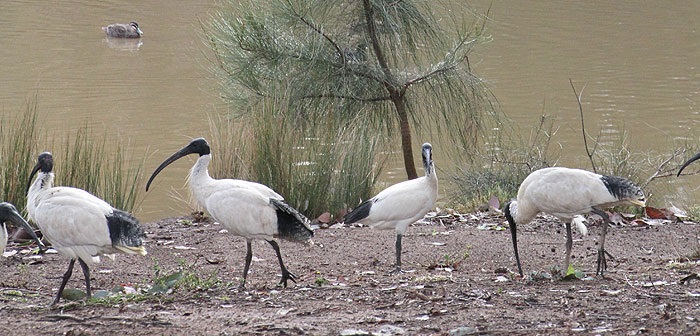Australian White Ibis

The Australian White Ibis is an Australian native bird species, protected under the NSW National Parks and Wildlife Act 1974.
What do Australian White Ibis look like?
The Australian White Ibis is identified by its almost entirely white body plumage and black head and neck. The head is featherless and its black bill is long and down-curved. During the breeding season the small patch of skin on the under-surface of the wing changes from dull pink to dark scarlet.

Why are Australian White Ibis here?
The Ibis bird's traditional breeding sites are marshes and swampy areas in inland Australia. However, in recent years, these inland waterways have been impacted and decreased due to drought and variations in water management practices. This has forced the Ibis to move towards the eastern seaboard, searching for new breeding and feeding sites. The Ibis have found a home in the suburban NSW, often around recreational sites such as lakes where they can find protection and food sources.
Why are Australian White Ibis a problem?
Ibis have become dependent on artificial food sources like food scraps in parks and public areas, hand feeding, and rubbish tips. This has caused their numbers to increase unnaturally, with breeding observed outside the usual breeding times. Their large numbers impact negatively on the environment and the amenity of the local area.
The impacts can include:
- Extensive damage to native plants, as Ibis use them to make their nests and to roost in.
- The addition of excessive amounts of nutrients into the ecosystem through their droppings, discarded eggs and deceased carcasses, causing poor water quality.
- Domination of the local environment, making it harder for other wildlife to survive and out competing local animals for food and habitat.
- Decreased recreational value of public places through smell, noise, and birds harassing humans for food.
- Public health risks through disease transmission.
- Encroaching on private property and causing a nuisance to residents.
How is Council managing the Australian White Ibis?
Ibis populations in the Campbelltown LGA have significantly increased over the past 3 years affecting the local environment, public amenity and prompting a management action response from Council.
In August 2015, Campbelltown City Council adopted a Management Plan for Australian White Ibis at Lake Mandurama, Ambarvale and in August 2016 adopted a Management Plan for Australian White Ibis at Eagle Vale Pond, Eagle Vale.
The plans aim to enable Council to effectively mitigate site specific negative impacts associated with Ibis and to provide comprehensive and clear guidelines for on-site management.
Management practices identified in the plan include egg oiling, collection of dead carcasses and eggs, community education, replacement of rubbish bins and nest burning. These practices are approved humane ways to reduce the local Ibis population and to manage their impacts when nesting in one area.
For further information on management practices view the:
Australian White Ibis Plan of Management for Lake Mandurama, Ambarvale(PDF, 1MB)
Australian White Ibis Management Plan for Eagle Vale Pond, Eagle Vale(PDF, 622KB)
How can you help manage the Australian White Ibis?
There are some very simple things that you can do to assist in managing the Ibis population:
- Never feed the Ibis or any other wildlife. Human food is extremely bad for the health of wildlife, and providing an easy source of food leads to a loss of natural instincts.
- If you live near a known colony, collect any sticks and twigs from your property and place them in your garden organics bin to reduce availability of nesting material.
- Always make sure your waste is placed in the bin, with the lid down so that Ibis and other birds and animals don’t have access to it.
- When enjoying one of our many parks, always put your rubbish in the bin, or take it with you. The Ibis will continue to inhabit areas with a regular food source, so disposing of waste responsibly will help to reduce numbers naturally.
- Teach your friends and family the importance of not feeding Ibis or any other wildlife.
For more information on the program, phone our Environment Unit on 02 4645 4601.